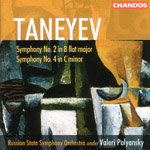Sergei Taneyev’s standing as an important Russian composer has been revived in recent years, and his Symphonies Nos. 2 and 4 are considered among his more accomplished works. But you’d never guess it from these performances. Valeri Polyansky’s indifferent rendering, with its stiff phrasing and slack rhythms, makes Symphony No. 2 sound like warmed-over Kalinnikov (particularly so in the rushed, texturally clotted finale). Things improve with Symphony No. 4, thanks to Taneyev’s brassy, boldly projected opening, which plays to Polyansky’s particular skill with music that’s loud and fast. But pretty soon the drab sameness of it all begins to wear on you. Admittedly, the former Tchaikovsky pupil never reached the sublime level of his mentor, but listening to Polyansky’s timbrally unimaginative renderings could lead you to conclude that Taneyev also didn’t pick up one iota of the elder composer’s brilliant sense of color. Then again, the Russian State Symphony is not exactly an orchestra prone to pretty sonorities, and certainly it doesn’t help that Chandos has recorded it in sound that’s as reverberant as it is opaque. If you’ve never heard any Taneyev, you really don’t want to start here.
































